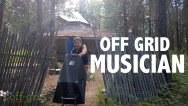
Florida: People vs. Utilities
A battle is developing in Florida between the solar power movement, and some of the most venal and vindictive utility companies in America.
At stake is the economic viability of Solar power in the state. Florida is one of four states — along with North Carolina, Kentucky and Oklahoma — that prevents citizens from purchasing electricity from sellers other than utility companies.
Both sides are proposing constitutional amendments for the 2016 ballot, either to allow solar panel owners to sell on their surplus energy, or (from the Utility companies) to force solar panel owners to keep paying towards the costs of the Grid even if they no longer use it. And the Utilities, with a $6m war-chest, are winning hands down with only a few weeks left to garner the vital signatures that will place the proposed amendments on the ballot paper.
Initiatives need 683,149 signatures — roughly 10 percent of voters in the last general election — by Feb. 1 to qualify for the ballot and allow a public vote on a proposed statute or constitutional amendment.
And once they’re on the ballot, at least 60 percent of voters must approve constitutional amendments.
It’s an expensive and complicated feat, and even some of the stronger contenders for a spot on next year’s ballot appear to be faltering.
One of the most popular proposals came from Floridians for Solar Choice Inc., a group of Tea Party supporters and environmentalists working to allow individuals and businesses, not just Florida’s utility companies, to sell solar electricity.
This group collected 273,280 verified signatures as of Dec. 22 to get its proposed amendment on the ballot. It has another 212,000 signatures awaiting verification by the Florida Department of Elections, which has 30 days from the date of receipt to complete the process.
But it seems unlikely Solar Choice Inc. will collect the nearly 198,000 verified signatures still needed by Feb. 1 to get its initiative on the November ballot. In light of the shortfall, group leaders told The Associated Press they were exploring options to get on the 2018 ballot, instead of November’s.
Opponents, meanwhile, say the proposal would shift millions of dollars in costs to consumers who remain with utility companies.
The James Madison Institute, a nonpartisan economic think-tank based in Tallahassee, published a policy brief arguing against providing a constitutional carveout for solar energy.
It said Florida law requires traditional utility companies to maintain a network that provides for all households with their operating area, regardless of whether or not these households are connected to their grid. As households increasingly move off the grid and switch to solar energy, it would be up to the remaining consumers to cover fixed maintenance costs, which could pass $1 billion within three years, the institute argues.
“We felt very strongly that the issue at hand is a public policy question, not an issue for …
